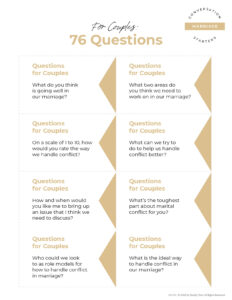Sara arranged expensive cheeses on the plate as her husband, Chris, sat across the counter and stared at his phone. “Busy day?” she asked. Chris grunted, not looking up from his phone. Sara didn’t care enough to try again. It wasn’t always like this. Just a year earlier, Chris would’ve been picking out a bottle of wine as they chatted about their days or their dreams. Now, they were roommates sharing a charcuterie board.
If Sara and Chris’s evening sounds familiar, it’s OK. Even the strongest bonds can experience periods of emotional distance. Life throws us curveballs, routines settle in, and sometimes, connections get lost in the shuffle. But it’s important to recognize signs of emotional detachment in marriage and take steps to reconnect. If you want your marriage to get over this hump, here’s how to do it.
What’s emotional detachment in marriage?
So, emotional connection is like playing catch. You throw a feeling or thought (“I’m feeling overwhelmed today”), and your partner catches it (listens and tries to understand). Emotional detachment is when the game stops. Maybe you don’t feel like throwing anymore (withdrawing), or your partner isn’t catching what you’re throwing (not listening or seeming distant).
What can cause emotional detachment in a marriage?
According to marriage.com, it’s a mix of things, really. Sometimes, it’s leftover fights we haven’t quite dealt with, or maybe we just haven’t been talking much lately. Of course, bigger things can play a role, too, like if there’s been infidelity or someone’s been struggling with addiction. Even mental health stuff like depression or anxiety can make it hard to connect. Then there are bad habits that build up over time, like always avoiding tough conversations or shutting down when you should talk it out.
What are the signs of emotional detachment in marriage? And better yet, how can you overcome it?
1. Conversations are disappearing.
Those long, late-night talks when you shared everything used to be a highlight of your marriage. Now, conversations feel forced, filled with logistical details or polite small talk. Maybe you find yourself confiding in friends or family more than your husband.
Reignite the spark by scheduling dedicated talking time. Set aside 10 minutes each day, distraction-free, to simply talk. No phones, no TV, just focused conversation. Take turns choosing topics, or use prompts like “What’s something you’re looking forward to?” Our Conversation Starter Printable has 76 questions to choose from. And practice active listening. Give your husband your full attention, make eye contact, and ask clarifying questions to show you’re engaged.
2. You feel like a lonely roommate.
You share a living space, but evenings are spent in separate corners, engrossed in whatever pursuit has your attention this month. Sex may have dwindled, or it feels more like a chore than a connection.
Evict the roommate and get your husband back by planning quality time together. If a date night isn’t possible, try to “do life” together more. Sit next to each other on the bleachers at your daughter’s volleyball game. Do the week’s grocery shopping together while your kids play at the neighbor’s. Be intentional about physical touch. Non-sexual affection like holding hands, cuddling while watching TV, or giving a quick kiss on the cheek can be a powerful way to reconnect.
3. There’s an emotional wall.
You feel like you can’t share your true feelings with your husband. He seems uninterested or dismissive when you try to express yourself, leading you to bottle things up.
Break down the barriers by starting small. Pick a manageable topic and share your feelings calmly and clearly using “I” statements: Instead of accusatory statements like “You never listen to me,” say, “I feel hurt when I try to talk and you seem distracted.”
If you’re feeling overwhelmed about where your marriage is right now…
Find comfort knowing this happens to many couples, and feeling emotionally detached doesn’t mean your marriage is over. Taking the initiative to address emotional distance is a powerful act of love and commitment to your marriage.
What makes you feel emotionally connected to your husband?











